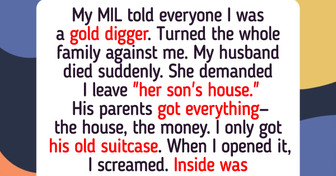My MIL Demanded Rent for a House That Isn’t Hers, I Turned the Tables


According to the UK Government’s National Department of Health, the average smoker needs over 5,000 cigarettes per year, which means that they must spend a lot of money to buy them. The economic crisis and the arrival of e-cigarettes have both made it easier and essential for many people to quit smoking. However, e-cigarettes have not been proven to help smokers quit smoking for good and end up getting them hooked on vaping. Therefore, smokers have to turn to other options and solutions that are way healthier, but require great willpower.
Bright Side has found 8 ways that have been proven to be effective in kicking the habit of smoking. The best part is that none of these methods are expensive!
A study that compared abrupt quitting with a slow reduction of smoking didn’t find either of them to be more effective than the other. This means that you can choose your method based on what you think will work best for you. In both cases, you have to be prepared for the difficulties. Medical News Today suggests that you let people know that you quit smoking, throw away all your cigarettes, and decide on which method you will follow.
According to a study that was published in 2012, people who ate fruit and vegetables 4 or more times per day were 3 times more likely to reduce their smoking than people who ate these foods less than 2 times per day. The lasting effect of that habit lasted up to 14 months. The study also demonstrated that certain foods like dairy, milk, fruits, and vegetables all make the taste of cigarettes worse which means that you won’t experience as many cravings. This means that you should avoid trigger foods like low-calorie meals, alcohol, and coffee.
A study concludes that most smokers can’t quit smoking due to nicotine dependence and psychological distress since they treat smoking as a tension reliever. It has been proven that combing NRT with non-nicotine medication and behavioral support increases the chances of long-term smoking cessation by 25%. Behavioral support can be therapy in a group or individually, either by phone, email, or face-to-face. Also, there are various Nicotine Anonymous groups that you can attend by finding one near your area.
There isn’t a single smoker that doesn’t think they enjoy their coffee and alcohol better with a few cigarettes. This is why the NSW Government advises that you cut back on your coffee and alcohol intake. On one hand, caffeine can increase the level of anxiety and make you feel restless, both of which are triggers of nicotine withdrawal symptoms. On the other hand, alcohol relaxes your brain muscles and can make you forget all the reasons that made you want to quit smoking in the first place.
The Centre for Addiction and Mental Health emphasizes the fact that people who smoke have reduced energy and less of a desire to exercise due to their decreased pulmonary function. Cutting back on smoking will gradually increase the need for exercise and, according to Van Rensburg and Hodgson, will decrease the desire to smoke and reduce cravings and withdrawal symptoms.
Also, according to a study that was published in 2007, physical activity can help with depression, stress, irregular sleep patterns, and cognitive functioning, most of which are usual symptoms of smoking cessation, as mentioned above.
According to the American Dietetic Association, smokers gain approximately 4-10 lb after they quit. This happens because they feel the need to snack on something since they can’t smoke. What the association advises is to carry a healthy snack or some gum with you at all times. The gum will keep your mouth occupied and your cravings in check. If it doesn’t work for you, you can carry a few healthy snacks, such as almonds or fruit, and eat a small portion when you feel like smoking. You can also drink a sugar-free beverage or a cup of tea instead.
The American Cancer Organization advises that you stay away from people and places that you associate with smoking since they might trigger a relapse. You should let people know that you have quit smoking and meet them in places that remind you nothing of it. Taking up new hobbies will create new and healthier habits in non-smoking environments. These places will be safe and will give you the power you need to face every possible temptation.
It’s very hard to quit smoking and almost every smoker knows this. No method is guaranteed to work on everybody and it all depends on the individual. Please share your experiences with quitting and tell us if any of the above methods have helped you reduce your tobacco intake.











